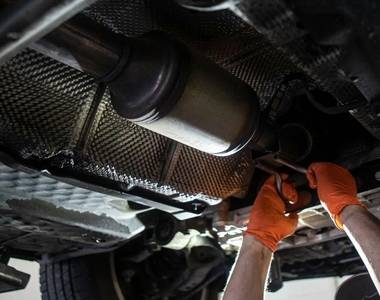If you're one of the millions selling your car, we're willing to bet you want the most for it. In reality, what "the most'' means for you requires a cost-benefit analysis. Depending on the type of car you have, your desired payout and willingness to put forth effort, one of these six strategies is guaranteed to get you a fair deal for your car.

Thinking about selling your car in the UK? Check out this comprehensive guide to learn six proven ways to make the most money possible from your transaction.
How to Sell Your Car in the UK and Get the Most for It: Best Guide for 2023

In 2022, 6,890,777 used cars changed hands in the UK. Although that number represents a slight decline, the numbers are clear: plenty of people are interested in second hand cars (including yours).
To meet the millions of UK car buyers, it goes without saying there are plenty of ways to turn your car into cash.
But they aren't all created equal. Some yield higher payouts. Others are quicker and easier. A few protect you and your buyer from car selling scams.
Whether you're in the market for a newer vehicle or you just want to get rid of your current one, here are the best strategies for selling your car in the UK and getting the most for it.
A Brief Overview of the Car Selling Process in the UK
Fundamentally, selling a car in the UK is quite simple. All you need to do is transfer your ownership of the car and provide documents that prove it. In most cases, this means filling out a V5C form and finding someone willing to buy it.
The usual process looks something like this:
- Address repairs and maintenance
- Clean your car thoroughly
- Organise all your documents (including your V5C logbook and valid MOT certificate)
- Research the market value of your make and model and use a car valuation calculator
- Decide how you would like to sell your car
- Shoot photos and advertise it (if applicable)
- Finalise the deal when you're happy with an offer
- Receive payment to your chosen account and transfer ownership
- Fill out the V5C and notify the DVLA to make it official
6 Proven Ways to Sell Your Car in the UK
Of course, plenty of nuances come with this process. The trajectory of your sale will depend on the type of car you are selling, its condition, current market dynamics and (most importantly) how you choose to sell it.
Online Car Buying Sites
These days, people turn to the best sites for selling cars because they offer the most frictionless experience.
- You log onto the buyer's website and enter basic details like age, mileage and registration number.
- An algorithm evaluates your entry and returns a valuation in seconds.
- You take your car to a local depot to further assess it.
- The online site will present your vehicle to bidders who will compete to offer you the best price.
- If you accept a bid, you get paid quickly and the seller picks up your car (usually for free).
Compared to finding a qualified buyer, accommodating to others and constantly comparing offers, the convenience of selling a car online makes it an attractive choice.
However, there are a few caveats to be aware of.
For one, your valuation is only an estimate based on simple market dynamics and the company's predetermined profit margin. As such, it is subject to change at many points throughout the process. After they inspect your car, they may (and often do) substantially reduce the offer.
Although these services are extremely convenient, their ease of use comes with one major downside: you won’t get the most money for your car when using them.
According to experts at Which, you're "almost certain" to get a better price selling to a dealer, putting it up for auction yourself, or privately selling it. In one instance of their research, their buyer made £2,000 less than they would have gotten selling it to a dealer themselves.
So, while it is the most convenient option, using an online car buying site isn't the way to get the most money out of the transaction. For some, time is worth more than money. For others, this is a critical drawback.
Selling Directly to a Dealer

Selling your car to a dealership is slightly less convenient than using an online car buying service because you'll need to see multiple dealers to determine the best offer. Each visit will require an hour or two and you might find yourself for a few days before you hear back.
However, you avoid all the work and expenses associated with a private sale. You won't get the best price because the dealership has to pay its employees and make a profit on top of that, but you will have the safety and reassurance of working with a reputable business.
When you work directly with a dealer, you won't even have to worry about any of the paperwork. They'll usually notify the DVLA on your behalf and you'll have the money sitting in your account within a day or two.
For the best outcomes, here are a few tips:
- Have all your documents ready (including service records).
- Do research on both the dealership and its reputation. Try to find out what cars they're offering and how much they sell for.
- Visit several dealers to compare offers.
- Ask if your dealer is open to matching offers from other dealers.
- If you have a desirable car, don't be afraid to negotiate.
It's worth noting that selling to a dealer is only realistic if you have a newer car with minimal or nonexistent accident history, all necessary documentation and high current market demand — a black 2020 Ford Fiesta, for example.
Used car dealerships don't want pieces of junk that are going to sit on the forecourt for months. And they certainly don't want something that could pose a liability to them or their buyers.
As such, if your car is old or has been involved in any accidents, it's probably best to look elsewhere.
Private Sale

Selling a car privately is usually the best way to maximise your potential sale value. Since you're carrying out the process yourself, you have more control over the entire process.
Without an intermediary, such as a dealer or online site, nobody else needs to turn a profit from your car purchase. You'll get to keep 100% of the money you make from the sale.
If you sell the car yourself, the process will typically look like this:
- Prepare your vehicle for sale by cleaning it inside and out, fixing any minor issues, and gathering all the relevant paperwork (e.g., V5C, MOT certificate).
- Research market dynamics and understand where your car fits in.
- List your car to potential buyers. Post adverts on sites like Autotrader and Gumtree, promote it on social media, put a 'For Sale' sign up or whatever else you can think of.
- Field calls and emails from interested buyers, answer their questions, negotiate a price and arrange viewings and test drives for serious buyers.
- Safely handle the payment and transfer of ownership.
The main downside to this approach is that it requires considerable effort from you. You're the only one handling the sale, so it's all on you to find, vet and close with a buyer. Depending on your experience, selling the car can take weeks or even months.
It also leaves you vulnerable to car selling scams. One common example is a vehicle matching 'service' that will ask for a one-time refundable payment in exchange for finding you an immediate buyer.
This method does give you plenty of flexibility in terms of how you sell, though. If you're selling a car without a V5C, for example, no dealer or online site will even look at it. And if you're selling a damaged car, you'll have a much harder time finding a buyer through an intermediary.
Selling it yourself, therefore, is the best option when your car isn't in pristine condition or when you don't have the necessary documents.
Auctions

Selling your car at auction might get you more money than a private sale if two dealerships or private buyers enter a bidding war over it. But there isn't a guarantee it will reach its reserve price, so you could also end up with less.
If you aren't happy with the bid amounts or they don't make it to the reserve price you set, you'll need to take your car back and try again another time.
When you sell your car at auction, here's what to expect:
- You will pay to enter the auction.
- Then, you transport your car to the auction house.
- An expert will examine your vehicle and assign it a condition rating, which will determine its selling price.
- The buyer's premium is typically around 10%. This commission goes to the auction house as payment for their services.
- Most auction buyers are dealerships, car buying services and other businesses in the motor trade. If you're fortunate enough to grab the attention of a private buyer, they might be ready to offer more than a dealer.
Car auction companies like Manheim and British Car Auctions are the most popular choice for those who want to go this route. They have branches throughout the country and have great reputations.
You might want to auction your car online through sites like eBay as well. This entails a lot more work since you'll create the advert and answer lots of questions.
Hypothetically, anyone can take their car to an auction and sell it. You could sell a non-running car or salvage car if you wanted to (though auction houses set their own rules).
The most successful cars at auctions are those that are rare or classic, in good condition and have low mileage.
Online Advertising and Listing Sites
Online advertising sites like Autotrader and Gumtree are easy to use and enable you to set your own terms, lay out all your vehicle information and see who bites. You will sometimes need to pay a fee when you post an advert or list with any of these sites, but accessing their user bases of millions is certainly worth it.
There are a few benefits to listing your car this way:
- Free or low-cost listing gives you exposure to a wide range of buyers.
- You can target an audience that's interested in your car model and type.
- Many have partnered with vehicle history experts, certify your vehicle's HPI Check report and verify ownership for your prospects.
- It's easy to manage all of your enquiries in one place (and quickly see who is actually interested).
Customer confidence goes a long way, especially when you're selling privately. Listing your vehicle online and presenting the right documentation verifies your legitimacy to buyers and makes it much easier to close a deal.
Like a traditional private sale, you'll still need to vet potential buyers yourself and handle all the paperwork, including creating an invoice, transferring ownership details and answering questions.
Part-Exchange
If you plan on purchasing a new car with your sale money, heading to the dealership to part-exchange it might be the best choice. In a part-exchange, the dealer 'purchases' your car and puts the money they would have otherwise paid you towards your new purchase.
What usually happens is that the dealer appraises your car using their own system or online guide, then makes an offer based on its value (just like a traditional dealership sale).
The benefit here is you won't have to revisit the dealer to buy a new car — it can all be taken care of in one day. If you lead in your negotiation by saying you want a part exchange, however, the dealer might offer you a less-than-satisfactory offer on your vehicle.
Again, their goal is to make money. They won't be as eager to pay top dollar for your car if they know it's going straight into a new one.
To ensure a favourable outcome, there are two rules of thumb here:
- Don't tell your dealer you're interested in a part-exchange until after you receive your offer.
- Split the transaction into two processes (one for selling your car, another for buying the new one).
Want to learn more? These are the questions our sellers ask us the most.
What documents do I need to sell a car in the UK?
The most important documents required to sell your car in the UK are your V5C logbook and MOT certificate. Your buyer will also ask you for service and maintenance history, parts receipts and vehicle history to make sure you took good care of your car while you owned it.
Is selling cars from home legal in the UK?
It is legal to sell your car from home in the UK. Many private sellers don't have to leave their house to sell their car. Safety is the main concern when selling your vehicle from home. Without the protection of a dealership or online car buying site, you are at a higher risk of being scammed out of your money or car.
How many cars can I sell without paying UK tax?
As an individual private seller, there is no limit to how many cars you can sell without paying UK tax. Tax on auto sales in the UK only applies to auto traders or businesses that sell cars for a profit. If you make a personal sale, you do not have to pay tax on the money made from the car's sale.
Do I need a licence to sell cars in the UK?
In many parts of the UK (including England and Wales), there are no laws requiring car sellers to obtain a licence to operate a business. You will, however, need to be insured as a motor trader to sell cars. This insurance will cover you in case of any legal disputes or damage resulting from the sale.
What is the safest way to accept payment for a car in the UK?
Technically, the safest way to accept payment for a car is cash. Since the transfer is immediate and there is no discrepancy over whether the money will hit your account, you can be sure that the money is in hand. Plus, a cash handoff doesn't require you to give anyone your bank details or personal information like a bank transfer would.
The added benefit to this is that many private buyers prefer to buy cars in cash.
How long does it take to sell a car in the UK?
How long it will take to sell your car varies wildly based on what type of car you're selling, how many people want to buy it, whether you market it effectively and if your listing price accurately reflects the car's value. It is entirely possible to sell your car within a few hours. Your car may also sit with a 'For Sale' sign for months.
When is the best time to sell a car in the UK?
The best time of year to sell a car in the UK is during the spring and summer months. Rising temperatures usually coincide with a surge in car buying, especially in convertible and exotic car markets.
Is it better to sell my car privately or sell it to a dealership?
Whether you choose to sell your car privately or trade it at a dealership depends on your needs and overall goals. If getting the most money possible is important to you, then the benefits of doing the work to sell it yourself outweigh the drawbacks. If you value convenience, it is better to sell it to a dealership.
Are there any legal obligations or responsibilities when selling a car in the UK?
It is a criminal offence to sell your van, car, or motorbike if it is unroadworthy without the buyer's knowledge. It is also illegal to sell a car with outstanding debt on it — anyone looking to get a car off their hands would have to settle their finances with their lending organisation first.
What should I do if a potential buyer wants to test drive my car?
Before agreeing to a test drive, make sure your prospective buyer has a driving licence and Driving Other Cars (DOC) insurance cover. When they arrive for the test drive, start the car for them and sit in the passenger seat to accompany them. Before they leave, take a picture of the buyer's licence and car, in case anything happens.
How can I negotiate the price effectively when selling my car?
To effectively negotiate a price, always let the buyer bring up negotiations. When they do, talk through things and let them make the first offer as well. Don't be afraid to counter it if it's slightly short of what you were hoping for. It helps to plan ahead for your negotiation by thinking of a minimum sale price you would be happy with.
What precautions should I take to avoid scams when selling my car?
Do not pay anyone who tells you they can find you immediate buyers. Only accept payment through established and legitimate payment methods, such as cash or bank transfer. Avoid buyers who claim they want to pay more than the asking price by sending extra money and getting you to refund the difference. Don't give the buyer your keys until the payment is safely in your account.
Can I sell my car if it has outstanding finance?
Per UK law, it is a criminal offence to sell your car with outstanding finance. You must repay any debt before you can legally sell your car. Some dealers will be willing to cover this payment for you and deduct it from the sale price.










